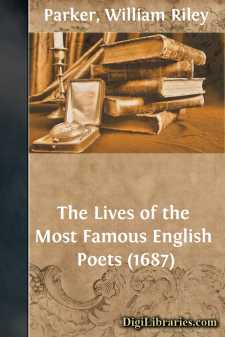Categories
- Antiques & Collectibles 13
- Architecture 36
- Art 48
- Bibles 22
- Biography & Autobiography 813
- Body, Mind & Spirit 142
- Business & Economics 28
- Children's Books 15
- Children's Fiction 12
- Computers 4
- Cooking 94
- Crafts & Hobbies 4
- Drama 346
- Education 46
- Family & Relationships 57
- Fiction 11829
- Games 19
- Gardening 17
- Health & Fitness 34
- History 1377
- House & Home 1
- Humor 147
- Juvenile Fiction 1873
- Juvenile Nonfiction 202
- Language Arts & Disciplines 88
- Law 16
- Literary Collections 686
- Literary Criticism 179
- Mathematics 13
- Medical 41
- Music 40
- Nature 179
- Non-Classifiable 1768
- Performing Arts 7
- Periodicals 1453
- Philosophy 64
- Photography 2
- Poetry 896
- Political Science 203
- Psychology 42
- Reference 154
- Religion 513
- Science 126
- Self-Help 84
- Social Science 81
- Sports & Recreation 34
- Study Aids 3
- Technology & Engineering 59
- Transportation 23
- Travel 463
- True Crime 29
The Lives of the Most Famous English Poets (1687)
Categories:
Description:
Excerpt
Introduction
This book merits more attention and respect from literary historians than thus far have been accorded it. The case must be stated carefully. The work has obvious faults and limitations, which probably account for its never having been reprinted since its appearance in 1687. Almost forty percent of it is largely or entirely derivative. Its author, William Winstanley (1628?-1698), was undoubtedly a compiler and a hack-writer; his attitudes and methods can hardly be termed "scholarly." Nevertheless, this pioneer in biographical and bibliographical research was more nearly a scholar than the man he is usually alleged to have plagiarized; he wanted to see the books that Edward Phillips was often content merely to list by title in his Theatrum Poetarum (1675), and altogether, for his own enjoyment and that of his readers, he quoted from the works of more than sixty poets. Moreover, unlike Phillips, he tried to arrange his authors in chronological order, from Robert of Gloucester to Sir Roger L'Estrange.
Though Winstanley's Lives advertises on its title page accounts "of above Two Hundred" poets, only 147 are actually listed in the catalogue, and only 168 are noted throughout. Of these 168, only 34 had not already been mentioned by Phillips, a dozen years before. Some borrowing was inevitable, and, in fact, Winstanley leaned heavily upon both Phillips and Fuller for information and clues, just as Phillips had leaned heavily upon Bale's Summarium (1548), Camden's Remains, Puttenham's Art of English Poesy, several Elizabethan miscellanies, and Kirkman's play catalogues. Both men built (as scholars must build) upon the obvious materials available. Both (in the manner of their age) were extremely casual about documentation and acknowledgment. If this leads us to talk unhistorically about "theft," we must say that Phillips "stole" from a half dozen or so people, whereas Winstanley simply appropriated a lot of these stolen goods. For doing so, he alone has been labelled a plagiarist.
Let us be more specific. Of Winstanley's accounts of 168 poets, 34 seem to have come out of the Theatrum Poetarum with nothing new added (10 of these 34 merely named). Of the remaining 134 accounts, 34 are of poets not mentioned by Phillips, 29 are utterly independent of Phillips, 40 are largely independent (that is, they borrow some from Phillips but add more than they borrow), and 31 are largely derivative. We would praise a doctoral dissertation that succeeded in giving so much new data. Winstanley was careless, but he was not lazy, and he had a literary conscience of sorts. Often he went to Phillips' sources and came away with more than Phillips found (most conspicuously in his use of Francis Kirkman's 1671 play catalogue).
Since the groundwork had so recently been laid, Winstanley's problem, far more than that of Phillips, was one of selection. In the Theatrum Poetarum 252 modern British poets are named. Of these Winstanley chose to omit the 16 female and 33 Scottish poets. Of the remaining 203, he dropped 68, and for the student of literary reputation these omissions raise some interesting questions....


